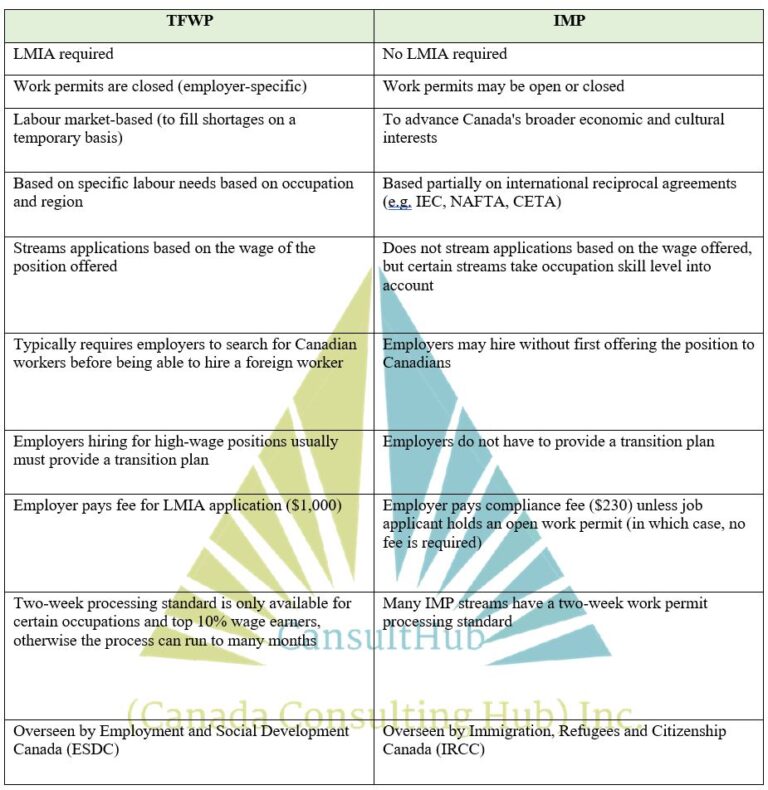International Mobility Programs(IMPs)
The International Mobility Program (IMP) is the one that can facilitate the process of hiring foreign workers for Canadian employers without applying for an LMIA, if that position provide cultural and economical interests. This stream uses for faster and simpler application process in comparison with temporary foreign which needs an LMIA and present number of advantages to both employers and employees.
What Is an LMIA
Labour Market Impact Assessment (LMIA) is a document that an employer in Canada may need to get before hiring a foreign worker.
A positive LMIA will show that there is a need for a foreign worker to fill the job. It will also show that no Canadian worker or permanent resident is available to do the job. A positive LMIA is sometimes called a confirmation letter.
If you are an employer and needs to apply for an LMIA, please Call Us for submitting this application.
Once an employer gets the LMIA, the worker can apply for a work permit.
To apply for a work permit, a worker needs
• A job offer letter
• A contract
• A copy of the LMIA, and
• The LMIA number
Comparison Between TFWP and IMP

According to the above explanations, IMP has different streams which are introduced as the LMIA exemption codes that you can receive the information by clicking here.
CansultHub Helps You Obtain your Work Permit through IMPs
Call CansultHub
Book a Free Consultation
Choose Your Immigration Package
Welcome to canada
From different categories of IMPs that are exempt from the LMIA, two of them are suitable for experienced managers or business owners who are aimed to run a business in Canada. Including C11 and C12 work-permits.
Everything You Need to Know About the C11 and C12 Work Permits
What Is C11 Work Permit
A C11 work permit is an LMIA exempt that is appropriate for applicants who are willing to run a business in Canada. The business plan plays a critical role for having a successfull C11 file that should professional and thoughtful. The main advantage of this immigration category is the opportunity the applicant finds to run a business in any provinces of Canada and the flexibility to do so.
Who Can Apply for C11
A C11 work permit is available to two different sorts of entrepreneurs. The first group consists of businesspeople who are looking for temporary entrance into Canada in order to pursue their careers as entrepreneurs. The second group is looking to enter in the self-employed or entrepreneurial residency program and receive a C11 work permit.
The C11 work permit is a LMIA-exempt work permit for individuals seeking to operate a business in Canada.
Types of Businesses Eligible for C11
- A company that specializes in outdoor activities
- Gardening and lawn care
- Service for home services
- Services for relocation
- Retailer
- Services for pool upkeep
- Coach or personal trainer
- and more.
Permanent Residency Status After C11 Work Permit
After getting the IMP C11 work visa, you should apply for Permanent Residency through on of the blow method. possibilities at the moment:
- As a businessperson or entrepreneur, immigration to Canadian provinces is possible (PNP programs)
- As a self-employed individual, you can immigrate to Quebec.
- Despite the limits on dual-purpose, an applicant who moves to Canada via this program and works for at least one year can apply through the Express Entry system under the Federal Skilled Worker program category. The required English level to apply for Permanent Residency under this stream is CLB7.
Some Key Questions You Need to Consider Answering in Your C11 Application to Increase the Chance of Acceptance!
- Will Your Business Benefit Canadians?
- Will You Use your Expertise and Background to Grow Your Business?
- Will Your Business Create Jobs for Canadians?
- Will Your Activities Lead to Regional Development or Even Exports from Canada?
- Will your Business Help Canadians Improve Their Skills (For Example Through Introducing New Technology or innovative Measures)
C11 Work Permit Processing Time
The first point that needs to be considered is that the issuance of C11 work permit takes shorter than other types of work permits as its LMIA-exepmt1. but it should may be considered the main delay can be accrued in preparing a thoughtful business plan that cover all criteria need to be approved by CIC. But we can say that if your documentations are complete, you can expect the issuance of your work permit in 90 days. (This is an average time so it can take you less or more time)
2. Everything About C12 Work Permit
What is C12 (ICT) work Permit
ICT is a secure pathway for Canadian Permanent Residency status which allows businesses to not being limited to a specific geographic location and setup their branch offices or affiliate across Canada which means these companies need to be able to get employees where they are needed to assist business prosper, so they can transfer employees to Canada through the ICT stream.
LMIA Exempt Work Permit Opportunity
The good news is the qualified intra-company transferees only require work permits that are exempt from the Labor Market Impact Assessment (IRPA paragraph R205(a), exemption code C12). This issue is concluded to the overall processing time for visas and makes it easier to obtain.
What Are the Documents Required for Intra Company Transfer to Canada (ICT/C12)?
- Complete and Sign C12 Application Forms
- Have a Submited Employement Offer in the Portal
- Prepare a Business Plan
- Suppoting Documents Like Business Tax Return or Profit/Loss Statement
- Proof of Current Employement
- Having Invitation Letter from A Canadian Empoyer/Company
Intra-Company Transferee (ICT) Work Permit
The ICT work permit is an entrance for qualified foreign workers to come to Canada and secure their permanent residency status. If the applicant is an employee of an organization that has a holding company, branch office, or an affiliate in Canada, he may be eligible to apply for a Canadian work permit through the ICT program. The successful individuals or the intra-company transferees provide significant economic benefit to Canada through the transfer of their talents and skills to the Canadian labor market. Immigration, Refugee, and Citizenship Canada (IRCC) accepts applications for this program from any nation. The ICT work permit allows qualified foreign skilled applicants to work lawfully in Canada, while also possibly opening several permanent residency routes for them.Therefore, if a foreign national is an employee of a multinational company in a location outside of Canada, they may be eligible to obtain an LMIA-exempt work permit to transfer to one of the company’s locations within Canada. The intra-company transferee rule applies to all countries.
Qualified Businesses for ICT Work Permit
The Intra-Company Transferee (ICT) program may be for you if you own and/or work in a foreign firm and want to establish a presence in Canada. In this matter, one of our top-ranked immigration lawyers can review and assess your business portfolio and documents. Therefore, book an appointment with us now to know if your business is qualified or not. According to the ICT guidelines at CIC, a qualified business for obtaining work permit under this stream is a multinational one that has a branch, holding company, subsidiary, or affiliate in Canada. The following types of companies may qualify:
1- Enterprise: any corporation, limited liability company, partnership, unincorporated organization, association, or other entity.
2- Parent Company: if a company owns and operates one or more subsidiaries, it could be a parent company.
3- Subsidiary: a subsidiary company, also known as the daughter company, is the one that is owned by a parent company, or holding company.
4- Branch: the branch of a company is the one owned by the parent, and it can have several addresses.
5- Affiliate: an affiliate is a business entity that is linked to another company, typically by being in the position of a member or a subsidiary.
Employment Eligibilities
The basic requirements that must be fulfilled are as follows:
– The transfer process of the employee by the Canadian employer should be short-term in nature.
– The relationship between the foreign company sending the employee to Canada and the Canadian company must be valid. Proof must be provided to prove the employer-employee relationship
– The transferee must be working in a position of executive or senior managerial or a worker with “specialized knowledge”
– The transferee must be working full-time with the foreign entity
– The transferee must have worked at least one year in a three-year period immediately preceding the date of application
– The transferee must intend to return and join his foreign company at the end of the Canadian job
Permanent Residency Status
The process of becoming a permanent resident (PR) after ICT work permit in some ways is like international students who come to Canada to study and eventually they secure their permanent residency through Express Entry or PNPs. If they are eligible to enter the Express Entry pool, their Canadian job experience contributes to their Comprehensive Ranking System (CRS) score. Thus, the qualified applicant can also choose to live in Canada indefinitely. Although, ICT gives the opportunity of being a temporary foreign worker in Canada, the LMIA-exemption and also several PR pathways are greats ways for these applicants to achieve permanent status in Canada. So, if the applicant has been eligible for Express-Entry, Canadian job experience under ICT will have a positive impact on the their Express Entry profile. After, one-year work experience, the transferred applicant will be qualified for extra fifty points which increase the total CRS score in the Express Entry pool. Obtaining a good English test score and Educational Credential Assessment (ECA) will be essential to proceed for the Express Entry pool submission.
ICT advantages
– The spouse/ Common Law Partner can obtain an Open Work Permit
– Transferee’s children have the same right with Canadians to study for free in public schools and pay less tuition for private one in comparison with international students until university.
– Applicants are eligible for free Provincial Health Coverage
– It is a pathway to get PR and Canadian Citizenship

